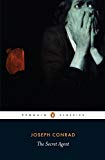
The Secret Agent follows the exploits of Mr. Veloc, a secret agent who spies on revolutionary groups for an unspecified Embassy. The Embassy, hoping to incite public outrage about anarchists, orders Veloc to blow up an Observatory. Veloc carries out his orders, but his mentally impaired brother-in-law Stevie is killed in the blast. When Veolc's wife Winnie discover's her husband's role in her brother's death, she kills him. This novel of intrigue explores themes of terrorism, anarchism, and exploitation.
Terrorism and anarchism are intrinsic aspects of the novel, and are central to the plot. Verloc is employed by an agency which requires him to orchestrate terrorist activities, and several of the characters deal with terrorism in some way: Verloc's friends are all interested in an anarchistic political revolution, and the police are investigating anarchist motives behind the bombing of Greenwich.
The novel was written at a time when terrorist activity was increasing. There had been numerous dynamite attacks in both Europe and the US, as well as several assassinations of heads of state. Conrad also drew upon two persons specifically: Mikhail Bakunin and Prince Peter Kropotkin. Conrad used these two men in his "portrayal of the novel's anarchists". However, according to Conrad's Author's Note, only one character was a true anarchist: Winnie Verloc. In The Secret Agent , she is "the only character who performs a serious act of violence against another", despite the F.P.' s intentions of radical change, and The Professor's inclination to keep a bomb on his person.
Critics have analysed the role of terrorism in the novel. Patrick Reilly calls the novel "a terrorist text as well as a text about terrorism" due to Conrad's manipulation of chronology to allow the reader to comprehend the outcome of the bombing before the characters, thereby corrupting the traditional conception of time. The morality which is implicit in these acts of terrorism has also been explored: is Verloc evil because his negligence leads to the death of his brother-in-law? Although Winnie evidently thinks so, the issue is not clear, as Verloc attempted to carry out the act with no fatalities, and as simply as possible to retain his job, and care for his family.
The role of politics is paramount in the novel, as the main character, Verloc, works for a quasi-political organisation. The role of politics is seen in several places in the novel: in the revolutionary ideas of the F.P. ; in the characters' personal beliefs; and in Verloc's own private life. Conrad's depiction of anarchism has an "enduring political relevance", although the focus is now largely concerned with the terrorist aspects that this entails. The discussions of the F.P. are expositions on the role of anarchism and its relation to contemporary life. The threat of these thoughts is evident, as Chief Inspector Heat knows F.P. members because of their anarchist views. Moreover, Michaelis' actions are monitored by the police to such an extent that he must notify the police station that he is moving to the country.
The plot to destroy Greenwich is in itself anarchistic. Vladimir asserts that the bombing "must be purely destructive" and that the anarchists who will be implicated as the architects of the explosion "should make it clear that [they] are perfectly determined to make a clean sweep of the whole social creation." However, the political form of anarchism is ultimately controlled in the novel: the only supposed politically motivated act is orchestrated by a secret government agency.
Some critics, such as Fredrick R. Karl, think that the main political phenomenon in this novel is the modern age, as symbolised by the teeming, pullulating foggy streets of London (most notably in the cab ride taken by Winnie and Stevie Verloc). This modern age distorts everything, including politics (Verloc is motivated by the need to keep his remunerative position, the Professor to some extent by pride), the family (symbolised by the Verloc household, in which all roles are distorted, with the husband being like a father to the wife, who is like a mother to her brother), even the human body (Michaelis and Verloc are hugely obese, while the Professor and Yundt are preternaturally thin). This extended metaphor, using London as a center of darkness much like Kurtz's headquarters in Heart of Darkness , presents "a dark vision of moral and spiritual inertia" and a condemnation of those who, like Mrs Verloc, think it a mistake to think too deeply.
Already have an account? Log In Now